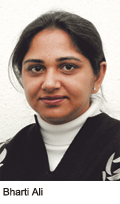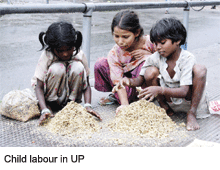A status report on India’s children titled Still Out of Focus, released by the New Delhi-based HAQ Centre for Child Rights (estb. 1999), has thrown cold water over the grand declaration made in the approach paper of the Eleventh Plan (2007-12), which states that, “Development of children is at the centre of the Eleventh Five Year Plan. The Plan strives to create a protective environment, which will ensure every child’s right to survival, participation and development.”
 Although Still Out of Focus was released in Delhi on January 22 by Shantha Sinha, chairperson of the National Commission for Protection of Child Rights, the conclusions of the report were highlighted in Lucknow on April 24 through a series of presentations made by Bharti Ali, co-founder and director of HAQ. “No amount of planning will succeed until there is seriousness about children’s issues. One of the most effective ways to measure this seriousness is the budget allocated to children and the time devoted to discussing children’s issues in Parliament. On both counts, India fares poorly,” says Ali, who walked several audiences comprising educators, principals, NGO represent-atives and media personnel through the report at seminars held through April in several cities and towns of Uttar Pradesh (pop. 166 million) — India’s most populous and educationally backward state.
Although Still Out of Focus was released in Delhi on January 22 by Shantha Sinha, chairperson of the National Commission for Protection of Child Rights, the conclusions of the report were highlighted in Lucknow on April 24 through a series of presentations made by Bharti Ali, co-founder and director of HAQ. “No amount of planning will succeed until there is seriousness about children’s issues. One of the most effective ways to measure this seriousness is the budget allocated to children and the time devoted to discussing children’s issues in Parliament. On both counts, India fares poorly,” says Ali, who walked several audiences comprising educators, principals, NGO represent-atives and media personnel through the report at seminars held through April in several cities and towns of Uttar Pradesh (pop. 166 million) — India’s most populous and educationally backward state.
Divided into eight chapters which highlight policy implementation, early childhood, health, education, violence, juvenile justice, child labour and child trafficking, the report laments that despite a plethora of laws and regulations, the inability of legislators to arrive at a comprehensive and common definition of the word “child” is the root cause of the country’s failure to provide for children. Moreover the 233-page report shatters several myths about child rights issues.
Thus, the authors of the report advance the argument that children are discouraged from studying because employers need them to depress general wage levels. It also dismisses the distinction made between hazardous and non-hazardous work by child labour legislation as fallacious. Currently the list of hazardous occupations defined under the Child Labour, Prohibition and Regulation Act, 1986 includes only 15 occupations and 57 processes. This limited definition of hazardous occupations in which child labour is prohibited has made their employment in non-hazardous industries permissible. Thus 3.4 percent of India’s 180 million children aged between five and 14 are out of school and engaged in non-hazardous occupations.
 The unsparing report also lambasts the home, social justice, women and child welfare ministries at the Centre for failure to compile data on the number of children trafficked every year. It says that discussions on this huge problem are confined to child prostitution, even as children are trafficked for a variety of nefarious purposes such as begging, paedophelia, child marriage, adoption, organ trade and lately, even for surrogacy. It expresses amazement that the National Crime Records Bureau (NCRB), the country’s premier data gathering agency, doesn’t maintain a database on missing children as it is not a “cognisable crime”.
The unsparing report also lambasts the home, social justice, women and child welfare ministries at the Centre for failure to compile data on the number of children trafficked every year. It says that discussions on this huge problem are confined to child prostitution, even as children are trafficked for a variety of nefarious purposes such as begging, paedophelia, child marriage, adoption, organ trade and lately, even for surrogacy. It expresses amazement that the National Crime Records Bureau (NCRB), the country’s premier data gathering agency, doesn’t maintain a database on missing children as it is not a “cognisable crime”.
Still Out of Focus concludes with the observation that lack of data is preventing concerted action to check child abuse and violation of child rights, with NCRB recording selected crimes against children, and omitting glaring offences punishable under the Child Labour Prevention Act, 1986, and the Pre-Conception and Pre Natal Diagnostic Techniques Act, 1994.
Unicef’s Lucknow-based communication specialist Augustine Veliath discerns “sustained and endemic neglect of child rights within Indian society”. “At all levels we have neglected our children and compromised with the quality of their lives. Each one of us shares the blame for pushing our children into the margins,” says Veliath.
And with the overwhelming majority of India’s 450 million children pushed into the margins, there is little chance of India occupying centre stage of the world in the 21st century.
Vidya Pandit (Lucknow)